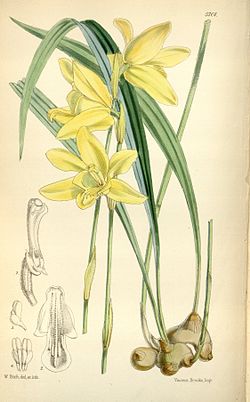Ipsea
| Habit | orchid
| |
|---|---|---|
| Lifespan: | ⌛ | perennial |
| Bloom: | ❀ | early winter, mid winter, late winter |
| Exposure: | ☼ | part-sun |
|---|---|---|
| Water: | ◍ | moderate |
| Features: | ✓ | flowers |
| Flower features: | ❀ | yellow |
|
Ipsea > |
If this plant info box on watering; zones; height; etc. is mostly empty you can click on the edit tab and fill in the blanks!
Ipsea is a genus of the Orchid family (Orchidaceae), endemic to India, Sri Lanka and North America.
Read about Ipsea in the Standard Cyclopedia of Horticulture
|
|---|
|
Ipsea (fancied resemblance to ips, a cynip insect or a worm). Orchidaceae. Two or 3 terrestrial E. Indian pseudobulbous orchids, allied to Pachystoma, with which it has been united: lvs. long, narrow and plicate: scape sheathed; fls. few, large, highly colored. I. speciosa, Lindl. (Pachystoma speciosum, Reichb.). Deciduous, tuberous-rooted, with erect scapes to 18 in. high: lvs. 5-8, long-petioled, 6-10 in. long: fls. several, bright yellow, fragrant, 2-3 in. diam., the lip oblong, with side lobes triangular and middle lobe obovate: pseudobulbs tufted. Ceylon.—Blooms in winter. To be potted in fibrous loam, peat and leaf-mold, and rested alter growth.
|
Cultivation
Propagation
Pests and diseases
Species
Gallery
References
- Standard Cyclopedia of Horticulture, by L. H. Bailey, MacMillan Co., 1963
External links
- w:Ipsea. Some of the material on this page may be from Wikipedia, under the Creative Commons license.
- Ipsea QR Code (Size 50, 100, 200, 500)

